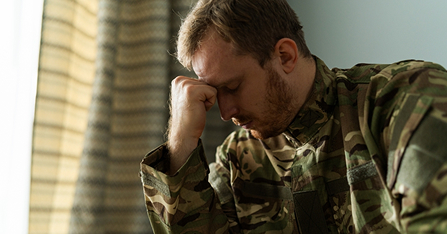Joining the military can be one of the most rewarding decisions a person can make, but the psychological stress of combat and training can leave a lasting imprint on a veteran’s health and wellbeing. Between meeting the strict military standards for weight and navigating the transition back to civilian life, many veterans develop eating disorders that leave them feeling stuck and out of control. While so much of military life is based on rules and numbers, you are much more than that.
If you are grappling with unhealthy eating habits or have already been diagnosed with an eating disorder, you may be eligible for eating disorder VA disability benefits. At VetLaw, our team of seasoned VA disability attorneys leverage years of experience to help you navigate the process of applying for benefits, increasing your eating disorder VA rating, and appealing unfairly denied claims. We offer a no-risk, no obligation free case review to all prospective clients. Consider contacting our veteran mental health claim lawyers today to get started.

Contact Us Today
We Will Fight For Your Benefits
We guarantee 100% privacy. Your information will not be shared.
What Are Eating Disorders?
Eating disorders are serious conditions characterized by continuous disturbances in eating behaviors and obsessive thoughts about food. These conditions impact your physical health, your ability to function in important areas of life, and your relationships with friends and loved ones. Some of the most common eating disorders that affect veterans include:
- Anorexia nervosa, a condition that involves the severe restriction or total avoidance of food. Symptoms of anorexia include emaciation, intense fear of gaining weight, and distorted body image.
- Bulimia nervosa, a condition characterized by episodes of binging then purging, generally through forced vomiting or the use of laxatives. Symptoms of bulimia include chronic throat pain, gastrointestinal issues, and dehydration.
- Binge-eating disorder, a condition that causes individuals to lose control of their eating Symptoms of binge-eating disorder include feelings of guilt, consuming unusually large quantities of food, and frequent dieting.
- Avoidant restrictive food intake disorder, which involves severe limitation of food. Symptoms often include loss of appetite and dramatic weight loss.
- Pica, a condition characterized by the consumption of nonfood and non-nutritive items.
Eating disorders are very serious and can be life-threatening. If you or a loved one is struggling with an eating disorder, it is important to seek treatment from a medical provider.
Does the VA Consider an Eating Disorder to Be a Disability?
Eating disorders diagnoses are on the rise among military populations, increasing 26% over a 5-year period. This statistic is like an underrepresentation, however, as underreporting is common and may service members avoid seeking medical attention. Given the high prevalence of these conditions, the VA recognizes eating disorders as a disabling condition and offers eating disorder VA disability benefits to eligible veterans and their families. To qualify for benefits, you must provide evidence demonstrating the following:
- You were diagnosed with an eating disorder
- An in-service event, illness, or injury occurred
- There is a nexus, or connection, between your diagnosis and the in-service event, illness, or injury

What Is the VA Rating for Eating Disorders?
Eating disorders are rated using the VA Schedule of Ratings for Mental Disorders, which assigns an eating disorder VA rating of 0, 10, 30, 60, or 100 percent based on the severity of symptoms and the level of social and occupational impairment experienced by the veteran. It is important to note that the VA only includes symptoms of anorexia and bulimia in this rating schedule, but the criteria are the same for both:
- 0 percent for patterns of binge eating followed by self-induced purging or other measures to avoid weight gain, but without incapacitating episodes.
- 10 percent for patterns of binge eating followed by self-induced purging or other measures to avoid weight gain, with incapacitating episodes lasting at least two weeks per year.
- 30 percent for self-induced weight loss to 85% of minimum weight with incapacitating episodes lasting between two and six weeks.
- 60 percent for self-induced weight loss to 85% of minimum weight with incapacitating episodes lasting longer than six weeks.
- 100 percent for self-induced weight loss to 80% of minimum weight with incapacitating episodes lasting longer than six weeks and hospitalization more than twice per year.
What If You Have PTSD and an Eating Disorder?
PTSD and eating disorders commonly co-occur, and these two conditions can complicate your symptoms and prolong your recovery. Oftentimes, veterans report that PTSD and its accompanying symptoms impact their eating habits, resulting in disordered eating behaviors and tendencies. The connection between these two conditions can be confusing, as symptomology tends to ebb and flow throughout life.
If you already proved your service connection for PTSD and have since been diagnosed with an eating disorder, you may qualify for a secondary service connection. Secondary conditions are conditions that arise due to or are aggravated by a primary service-connected disability. As long as you can prove that your eating disorder is connected to your PTSD symptoms, both conditions may be factored into your overall VA disability rating.
How Do You Prove Your Service Connection for an Eating Disorder?
To successfully receive eating disorder VA disability benefits, you must prove that your condition is directly connected to an event that occurred during your military service. This event could be a traumatic incident that happened during combat or a serious injury you sustained during your service, for example. A wide range of evidence can be used to prove service connection for an eating disorder, including:
- Medical evidence including doctors’ notes, diagnostic tests, lab reports, and treatment records.
- Nexus letters, which is a document written by a medical professional establishing a connection between your eating disorder and an in-service stressor.
- Lay statements written by your or someone close to you describing how your disability impacts your life on a daily basis.
- Vocational expert testimonies, which can provide useful context if your condition prevents you from working.
What If the VA Denies Your Disability Claim for an Eating Disorder?
Every year, the VA denies approximately a third of all disability claims. Being denied the benefits you need and deserve is frustrating, and many veterans feel discouraged to continue their case in the appeals system. If the VA denies your claim for eating disorder VA disability benefits, it is important to take action and seek legal assistance to determine the right course of action.
Based on the unique circumstances of your claim, your attorney will develop a legal strategy that takes full advantage of the VA appeals system. Depending on whether your claim is a Legacy case or Appeals Modernization Act, your attorney will help you file the proper documentation and initiate the appeals process, advocating for your rights at every step.
Hiring an Attorney Near You to Help with Your VA Disability Appeal for an Eating Disorder
Founded by a U.S. veteran and designed with veterans’ needs in mind, our nationally recognized disability firm is here to help you navigate the red tape of the VA process. At VetLaw, our team of experienced attorneys have the expertise and firepower necessary to take control of your claim and secure the benefits you are entitled to. Whether you are struggling to increase your eating disorder VA rating or you are stuck in the cycle of the VA appeals process, we can help. Schedule your free case review today to learn more.

